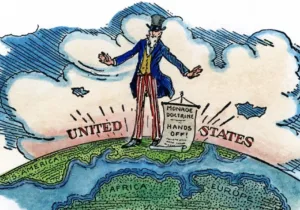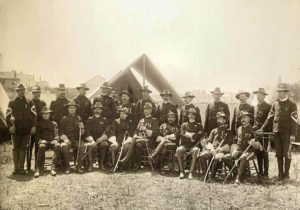Some state and local governments celebrate Indigenous Peoples Day instead of Columbus Day, which remains a federal holiday. Some progressive church groups have long opposed Columbus Day for supposedly celebrating conquest and genocide. This opposition to Columbus is rooted in Christian concern for victims but mistakenly demonizes Western culture as uniquely evil.
Columbus’s arrival in the Western Hemisphere unleashed many evils, chiefly European diseases for which native peoples lacked immunity, ultimately dying by the millions. That disaster was unintended and tragically not unique. Before modern medicine, the mass migration of peoples often unleashed catastrophic contagion.
The conquest and displacement of native kingdoms entailed more deliberate evils. European colonizers often assumed native pagan rulers had no right to sovereignty. They were then either conquered directly or inveigled out of their lands by chicanery and ruse. Some native groups were initially enslaved. Others were subject to slaughter if they resisted their new overlords.
Sadly, the post-Columbus conquest of the Americas revealed nothing new about human character. For thousands of years tribes had conquered others tribes, creating kingdoms that conquered other kingdoms, becoming empires that warred against other empires.
Columbus’s expedition partly was a reaction to centuries of Islamic conquests, which prevented or made very costly Western trade with the Orient. Spain through Columbus sought alternative trade routes to the East. That the Americas blocked that passage was a somewhat unexpected and unpleasant surprise. Those Islamic conquests, originating with Arab tribesmen, had conquered Christian, Persian, Hindu and Buddhist kingdoms, often eradicating the native culture and religion, while murdering or enslaving many of the conquered.
The Spanish and other Europeans did not introduce conquest, war and genocide into the Americas, which had hosted all of the above continuously for thousands of years ever since the first Asiatics crossed the ancient land-bridge connecting Siberia to what is now Alaska, populating two continents. Tribes coalesced into kingdoms and empires, conquering, enslaving and annihilating rivals. Brute force determined who ruled and controlled. Some native regimes were complex and vast, like the Aztecs, Mayans and Incas. They were also bloodthirsty and ruthless, exterminating enemies en mass and routinely slaughtering their own people, often in ritual sacrifices that their native pagan religions demanded. Blood flooded down the steps of their white temples as these sophisticated civilizations, guided by a powerful priestcraft, sought to appease their exacting deities.
Arguably, more primitive native cultures, lacking a vast temple system with powerful priests whose theology dictated the constant effusion of blood, were less bloodthirsty. These simpler tribes of North America usually lacked the vast and rich empires of the south. Their warriors killed rival tribesmen for practical reasons but were less inclined towards widescale ritual human sacrifice for theological reasons.
Across human history all conquerors have thought themselves superior to their victims. Their presumed superiority is based on brute strength, or believed superior religion based on specific divine favor for their tribe, or superior intelligence and skill evinced through their particular organization of civilization. The ancient Chinese no less than the ancient Greeks assumed their foes were barbarians who merited subjugation and disdain.
Columbus and Europeans of his time saw the natives as inferior pagans, just as Muslim conquerors saw their conquered peoples as infidels. Pagans and infidels, under a just and jealous deity, had no real right to self-rule. Europeans understood all baptized Europeans to be Christian by definition, irrespective of behavior or belief, just as Muslims viewed all within their caliphates as by definition Muslim, except subjugated Christians and Jews who accepted their permanent subordination.
None of these civilizations really recognized any right to dissent from the ruling regime, which combined religion with state and culture. The native cultures of the Americas especially had little concept of the individual, as all were subject to the chief, the tribe and the reigning cult, in sync, they believed, with nature and the spirits. These native cultures, like most cultures globally for thousands of years, had few if any reasons to object to conquest, slavery, genocide, and arbitrary rule by the strongest men who most successfully killed their rivals and managed the most wives while claiming the greatest riches.
Following Columbus’s expedition, European adventurers often plundered and killed to enrich and empower themselves at the expense of native peoples, just as native conquerors had long done with their own victims. But unlike the natives and many other conquerors, the Europeans were haunted by the specter of Christianity. They wanted the church to justify their rapine as the just desserts for God’s favored.
But the Gospel never stopped its assault on their consciences. That Gospel told them that all persons were kindred as creatures of God with eternal souls. That Gospel told them the powerful must not exploit the weak. That Gospel demanded justice and mercy. That Gospel did not conflate genuine worship with political control. That Gospel said all kingdoms will have an end and be judged by the standards of the eternal Kingdom. And that Gospel warned the last would come first.
European conquerors tried to ignore and manipulate that Gospel as they killed and defrauded natives, imported African slaves, and claimed European racial superiority. But the Gospel slowly defeated their arrogance and greed, and from that slow defeat there emerged a revolutionary new understanding of human equality irrespective of race. In the Gospel shaped societies, it slowly emerged that all people, at least theoretically, have an equal right to life, liberty and happiness. And in Gospel shaped societies, subjugated peoples ultimately were not derided but exalted.
So yes, we should celebrate indigenous peoples who were subjugated by Europeans who professed Christianity. But we should recall that those peoples were no less prone to universal human evils. Nobody today would tolerate living in ancient traditional indigenous societies, which were effectively totalitarian.
Columbus’s arrival in the Americas, for all the demons it unleashed, more importantly precipitated ultimately a new society where routine conquest and subordination are no longer acceptable. Thanks to his “discovery,” we now honor the defeated and reflect on the sins of the victorious, because we are all equally under divine judgment and mercy.
We should celebrate Columbus Day soberly and gratefully.







 Sponsor a student for Christianity & National Security 2024
Sponsor a student for Christianity & National Security 2024